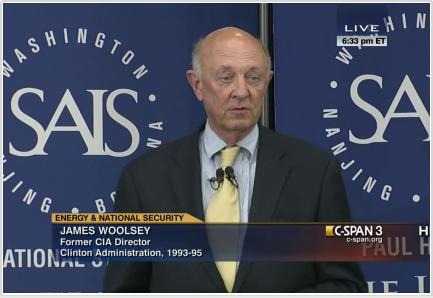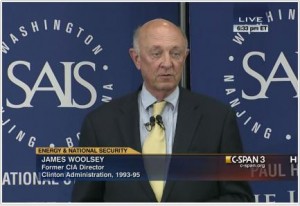
Former C.I.A. Director James Woolsey on Energy Security
On July 8th, 2013, former C.I.A. Director James Woolsey spoke at Johns Hopkins School of Advanced International Studies (SAIS) on the subject of energy security. The talk, titled “How Does Our Need for Foreign Energy Resources Impact Our National Security? A Conversation with Former C.I.A. Director Ambassador James Woolsey,” addressed two main topics: transportation and the electrical grid. Woolsey highlighted key vulnerabilities and challenges in both respects, and suggested solutions to protect our national security.
Woolsey specified three problems with the nation’s continued dependence on petroleum in transportation: OPEC wields too much control over the price of gasoline, the majority of proven reserves lie within authoritarian regimes that disrespect human rights, and gasoline—especially additives like benzene—is carcinogenic (Woolsey, also a former advisor on climate change, has addressed the environmental impact of fossil fuels elsewhere). He stressed that producing more petroleum domestically or importing only from democracies like Canada will neither lower the price of oil nor undermine OPEC.
The only solution is to offer consumers a choice at the pump. Woolsey argued for an open fuel standard, according to which cars could run on blends of petroleum, ethanol, or methanol, and the infrastructure adjustment to make this happen. The cost to manufacturers of transforming engines starts at ~$90 per unit, but fueling stations would have to introduce at least one new pump and tank. Methanol, which industry could derive from natural gas—abundant and cheap because of the shale boom—is the most suggestive alternative, said Woolsey. Both China and Brazil implement advanced ‘flex-fuel’ policies already.
Turning to the U.S. electrical grid, Woolsey applauded the conversion of plants from coal- to cheaper gas-powered generation, gains in solar and wind generation, and advancements in more affordable energy storage, such as batteries. But he highlighted three major concerns: the exposure of online control systems to hacking, the vulnerability of the grid to an electro-magnetic pulse (EMP), either solar or artificial, and the relative ease with which terrorists or vandals could damage large transformers. ‘Saboteurs’ in San Jose, California, recently shot rifles and cut underground fiber-optic cables at a major transformer station. Woolsey’s recommendations were far-reaching: he appealed to law enforcement to improve the security of transformer sites, proposed a micro-grid system whereby failures would remain localized, and endorsed more distributed generation via solar panels and small-scale storage.
Woolsey’s proposals would improve national security. Providing choices to consumers at the pump builds resiliency into the transportation system insofar as we no longer depend on one source of energy. Using low-carbon fuels, electric vehicles, and mass transit also reduces greenhouse gas emissions that contribute to climate change. Building more flexibility and security into the electrical grid, and generating more power at our homes minimizes the effects of potential terrorist attack and other catastrophic events. Woolsey, who also shared stories from his career and personal life, himself derives electricity for two hybrid automobiles from solar panels—not exactly Hollywood’s image of a spymaster.”






